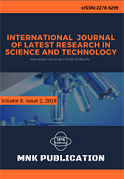DOI:10.29111/ijlrst ISRA Impact Factor:3.35, Peer-reviewed, Open-access Journal
Research Paper Open Access
International Journal of Latest Research in Science and Technology Vol.1 Issue 1, pp 60-69,Year 2012
Correspondence should be addressed to :
Received : 10 June 2012; Accepted : 25 June 2012 ; Published : 30 June 2012

| Download | 125 |
|---|---|
| View | 178 |
| Article No. | 10011 |
Present study in the paper is concerned with the development of new genetic operators to optimize the performance of the system. To improve the production facilities, a set of jobs are executed on the set of machines. For better performance there are large numbers of constraints. Process scheduling theory has been developed to meet all side constraints. Process Schedule is done in such a way that the resulting solution minimizes the given objective function. Many variants of the basic scheduling problem can be formulated by differentiating between machine environments, side constraints and objective functions. Genetic algorithm have been applied to OSPSP. The study shows that proposed operators shows better results
Copyright © 2012 Rajiv Kumar et al. This is an open access article distributed under the Creative Commons Attribution 4.0 International (CC BY 4.0) license which permits unrestricted use, distribution, and reproduction in any medium, provided the original work is properly cited.
Rajiv Kumar , " A Critical Study Of Genetic Algorithm?s Selection Operators Under Operating System Process Scheduling Problem ", International Journal of Latest Research in Science and Technology . Vol. 1, Issue 1, pp 60-69 , 2012

MNK Publication was founded in 2012 to upholder revolutionary ideas that would advance the research and practice of business and management. Today, we comply with to advance fresh thinking in latest scientific fields where we think we can make a real difference and growth now also including medical and social care, education,management and engineering.

We offers several opportunities for partnership and tie-up with individual, corporate and organizational level. We are working on the open access platform. Editors, authors, readers, librarians and conference organizer can work together. We are giving open opportunities to all. Our team is always willing to work and collaborate to promote open access publication.

Our Journals provide one of the strongest International open access platform for research communities. Our conference proceeding services provide conference organizers a privileged platform for publishing extended conference papers as journal publications. It is deliberated to disseminate scientific research and to establish long term International collaborations and partnerships with academic communities and conference organizers.